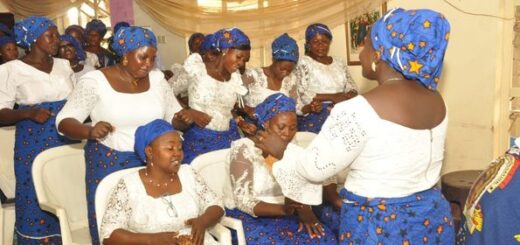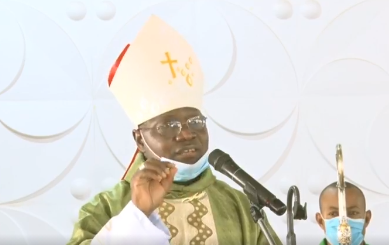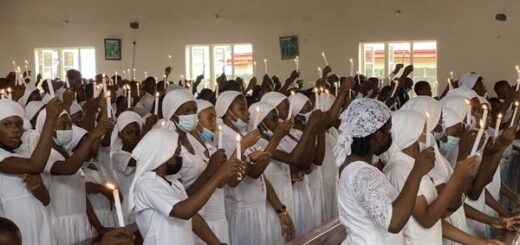The Year of Jubilee 2025: Pilgrims of Hope
by ARCH BISHOP · December 29, 2024
FIRST SUNDAY OF CHRISTMAS, YEAR C 29/12/2024/FEAST OF THE HOLY FAMILY/INAUGURATION OF THE JUBILEE YEAR OF HOPE
Readings: 1 Samuel 1:20-22, 24-28; 1 John 3:1-2, 21-24; Luke 2:41-52
Theme: The Year of Jubilee 2025: Pilgrims of Hope
We thank God for this year’s Christmas celebration. After the celebration, the attention of the almost 1.4 billion Catholics’ will now be turned to the “Jubilee Year of Hope.”
On May 9, 2024, Pope Francis released the Bull of Indiction, “Spes non confundit”(Hope does not disappoint cf. Rom 5:5) announcing the Ordinary Jubilee Year of 2025. The year has commenced with the ceremonial opening of the Holy Door of St. Peter’s Basilica on Christmas Eve, 2024. and today, on Holy Family Sunday, December 29, 2024, we are inaugurating the Jubilee Year in our Archdiocese as is the case with Catholic dioceses throughout the world.
In Hebrew tradition, a Jubilee is the year that follows the passage of 49 years. Leviticus 25:10 states: “And you shall sanctify the fiftieth year, and you shall proclaim a remission for all the inhabitants of your land: for the same is the Jubilee. A man shall return to his possession, and each one shall go back to his original family”. The land shall remain uncultivated (cf. Lev. 25:2–7; Ex. 23:10, 11, 12; Lev. 26:34, 35). Slaves would be released from servitude (cf. Leviticus 25:39-42): “If any of your fellow Israelites become poor and sell themselves to you, do not make them work as slaves. They are to be treated as hired workers or temporary residents among you; they are to work for you until the Year of Jubilee. Then they and their children are to be released, and they will go back to their own clans and to the property of their ancestors. Because the Israelites are my servants, whom I brought out of Egypt, they must not be sold as slaves.”
Some debts would be forgiven, (cf. Lv 25:28): But if they do not acquire the means to repay, what was sold will remain in the possession of the buyer until the Year of Jubilee. It will be returned in the Jubilee, and they can then go back to their property.”
Everyone was supposed to return to their own property in jubilee years (cf. Lv 25:13) “In this Year of Jubilee everyone is to return to their own property.”
The theme for the Year of Jubilee 2025 is “Pilgrims of Hope,” and it will indeed be a year of hope for a world suffering the impacts of war and violence, the effects of climate crisis, etc. In our case in Nigeria, the extraordinary inflation, resulting in crushing economic difficulties that rob the poor of their dignity, etc. The Holy Father urges Catholics especially, to recover, renew, and sow hope given the world’s troubles.
Holy Years normally occur every 25 years, and usually involve the opening in Rome of four special “Holy Doors”, which symbolise the door of salvation. Even though happening once every 25 years, the church has organised extraordinary jubilees, the most recent in 2016, the Extraordinary Jubilee of Mercy of 2015–2016. This particular Holy Year will run through January 6, 2026.
Pope Francis has also opened a “Holy Door” for the 2025 Catholic Holy Year at a prison in Rome (Rebibbia), bringing a message of hope and showing his closeness to inmates and involving them in the Catholic Church’s once-in-every-25-year-celebration that this time is expected to bring about more than 30 million pilgrims to Rome. Over the next 12 months therefore, Catholic pilgrims will pass through the Holy Door to venerate the relics of the Apostles Peter and Paul preserved in Roman basilicas. or embark on some spiritual practices to obtain a “plenary indulgence”, which is a full expression of the mercy or forgiveness of God.
In the papal bull marking the jubilee, titled “Spes non confundit” (hope does not disappoint), the Pope has called for amnesty or pardon for prisoners and for “pathways of reintegration” dedicated to them, as well as for “the abolition of the death penalty”. We, here in Nigeria, join the Holy Father in calling for some amnesty, not only for those in prison but also for Nigerians being kept in captivity as hostages or kidnapped victims, for months and long years. We plead that God will make all these involved in this negative phenomenon to realize that both those who are kidnapped and those who kidnap are children of God. We beg for the kind release to freedom of all those detained unjustly. As Pope Francis described prison as a kind of “cathedral of pain and hope,” we encourage those detained not to lose hope, as their liberation will come, by the special grace of God. In the words of Pope Francis, we say, “In bad moments, we can all think that everything is over. Do not lose hope…. Do not lose hope.”
The Joy of Christmas
With the birth of Christ, the Holy Family is complete, with Jesus, Mary, and Joseph united in love and harmony. As we celebrate the Feast of the Holy Family, we recognize them as a model for all families, demonstrating the beauty of unity, love, and devotion. The family, founded on the union between a man and a woman, is the fundamental building block of society. As such, the well-being of marriage has a direct impact on the family, and consequently, on the broader community. Therefore, nurturing healthy families is essential for building a strong and vibrant society.
The designation of Jesus, Mary, and Joseph as a “Holy Family” does not imply a life without its share of trials and tribulations. In fact, their journey, like that of any family, was marked by challenges, reminding us that holiness resides not in the absence of difficulty, but in the grace and resilience demonstrated in the face of adversity.
Even though holy, Joseph still experienced confusion and skepticism when Mary conceived Jesus through the Holy Spirit (cf. Luke 1:35). This caused immense pressure and internal conflict for Joseph who was contemplating a divorce from Mary, to whom he was betrothed (cf. Matthew 1:19).
Mary gave birth to Jesus in a manger wrapped him in swaddling clothes, because there was no room for them at the inn (cf. Lk 2:7). The threat from the wicked Herod forced the Holy Family to flee their home, seeking refuge in a foreign land (cf. Matthew 2:13).
Despite these and other challenges, the Holy Family still maintained harmony throughout. Rather than persevering through life’s inevitable family conflicts or challenges, many individuals today are increasingly prone to seeking drastic solutions, such as divorce, annulment, estrangement, or in extreme cases, suicide.
The Lessons of Marriage
Our first reading today recounts the fulfilment of Hannah’s vow to dedicate her son, Samuel, to the Lord’s service. We read that Hannah, barren and deeply grieved, prayed fervently to the Lord at the Tabernacle in Shiloh, vowing to dedicate her future son to the Lord’s service if He granted her a child. The Lord answered her prayer, and she gave birth to a son. After Samuel was weaned, Hannah and Elkanah fulfilled their vow by bringing him to the Tabernacle at Shiloh, presenting him before Eli, the high priest. Hannah expressed her joy, acknowledging Samuel as a gift from God.
This story offers three important lessons for families. First, it emphasizes the importance of fervent prayer. Just like Hannah, our families can emulate the act of constantly seeking God’s face, both in times of trouble, lack or in times of abundance. Secondly, we should never underestimate the power of God and His miraculous hand, for with God, nothing is impossible (cf. Luke 1:37). Finally, we are called to always keep our promises to God and not to treat Him as a mere “policeman” – turning to Him only in times of trouble and forgetting Him once our difficulties are resolved. Families will inevitably face challenges and difficulties, but their faith and commitment to God will see them through, to navigate those challenges.
The Responsibility of each party in the family
The Gospel today summarizes the years of Jesus’ life, stating that Jesus grew up in Nazareth like any other young man. He obediently fulfilled his responsibilities to his parents and to God, actively participating in the life of his community. During this time, he continued to grow in wisdom, age, and favour with both God and humanity (cf. Luke 2:52).
The carefully selected readings for this Sunday highlight the roles of each family member. Like Hannah and Elkanah, and Mary and Joseph, parents are entrusted with the responsibility of guiding their children to become God-fearing and obedient individuals. Ephesians 6 : 4 warns, “And you, fathers, do not provoke your children to anger, but educate them with the discipline and correction of the Lord.”
Children, exemplified by Samuel and Jesus Christ, are expected to honour their parents and align their lives with God’s will. Ephesians 6: 1 advises, “Children, obey your parents in the Lord, for this is just.
Ephesians 6: 2 demands of children: “Honor your father and your mother. This is the first commandment with a promise.”
Ephesians 6:3 adds: “so that it may be well with you, and so that you may have a long life upon the earth.”
Prayers for blessings to be holy in our lives
As we journey together in faith, let us seek the guidance of Christ, the intercession of our Blessed Mother, and St. Joseph, her chaste spouse. May we strive on building a family founded on love, prayer and on listening to the Word of God; practise unity within our own families, and extend this care to our parish community and to the civil society. We pray that families worldwide may flourish, filled with peace, joy, and enduring love, to create a home where God is at the center and where our children are nurtured in the faith and we support one another.
May the peace and joy of the Holy Family be with us all, and may we strive to make our families a reflection of God’s love in the world.
May God Bless all our families as we enter a New Year.




